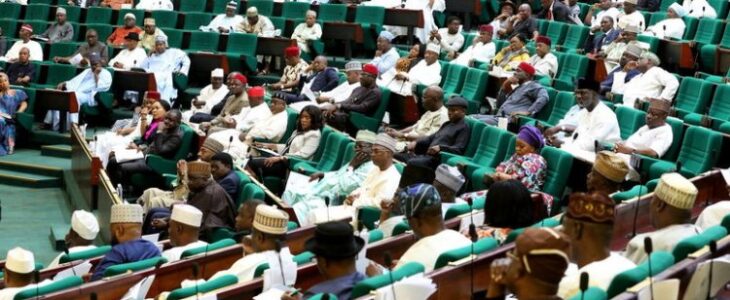
Senators have called on the executive to halt further electricity tariff increment, stating that the poor must be allowed to breathe.
The resolution followed a motion sponsored by Sen Akintunde Yunus Abiodun (Oyo Central), co-sponsored by Senator Asuquo Ekpenyong (Cross River South) and Sen Abbas, Aminu Iya (Adamawa Central).https://googleads.g.doubleclick.net/pagead/ads?client=ca-pub-5228780540891921&output=html&h=300&adk=3372357004&adf=3002841736&pi=t.aa~a.2067693828~i.1~rp.4&w=360&lmt=1690330565&num_ads=1&rafmt=1&armr=3&sem=mc&pwprc=4671932670&ad_type=text_image&format=360×300&url=https%3A%2F%2Fleadership.ng%2Fhalt-electricity-tariff-increase-lawmakers-tell-executive%2F&fwr=1&pra=3&rh=275&rw=330&rpe=1&resp_fmts=3&sfro=1&wgl=1&fa=27&dt=1690330565774&bpp=26&bdt=2495&idt=-M&shv=r20230719&mjsv=m202307200101&ptt=9&saldr=aa&abxe=1&cookie=ID%3D4f96b92d8274b836-22fba99eede200cd%3AT%3D1690330527%3ART%3D1690330527%3AS%3DALNI_MaiIFnJzqmVkCLG8lqRFj6SxNLDNA&gpic=UID%3D00000d9e7df32522%3AT%3D1690330527%3ART%3D1690330527%3AS%3DALNI_MbCzUcWreGpGSprPnG1uGLPAA683w&prev_fmts=0x0&nras=2&correlator=2724796110061&frm=20&pv=1&ga_vid=60921928.1690330527&ga_sid=1690330565&ga_hid=1923225231&ga_fc=1&u_tz=60&u_his=5&u_h=800&u_w=360&u_ah=800&u_aw=360&u_cd=24&u_sd=2&dmc=4&adx=0&ady=787&biw=360&bih=656&scr_x=0&scr_y=0&eid=44759926%2C44759837%2C44759875%2C31076444%2C44788441&oid=2&pvsid=3151725322926172&tmod=1307697489&uas=3&nvt=1&ref=https%3A%2F%2Fleadership.ng%2F&fc=1408&brdim=0%2C0%2C0%2C0%2C360%2C0%2C360%2C656%2C360%2C656&vis=1&rsz=%7C%7Cs%7C&abl=NS&fu=128&bc=31&ifi=2&uci=a!2&btvi=1&fsb=1&xpc=3zuAmkxWis&p=https%3A//leadership.ng&dtd=145

According to the Senate, Nigerians are now in hard times as a result of the removal of fuel subsidy, adding that gas, which is the major raw materials of electricity companies, has not been increased.
The Senate resolved that henceforth, town hall meetings on electricity should be held at the headquarters of the companies adding that communities that bought transformers or any electrical appliances should be compensated.

Accordingly, the Senate resolves to: “Call on the Federal Government of Nigeria to intervene and halt the proposed increase in electricity tariff by the Distribution Companies (Discos); urge Nigerian Electricity Regulatory Commission (NERC) to decentralize proposed engagement with Stakeholders scheduled for Abuja to the Six Geopolitical Zones of the Federation for effective participation by all, also urge NERC to thoroughly look into the rate review applications filed by the Discos, taking into consideration the interests of citizens, affordability, and the need for improved service delivery:
“Further urge NERC to explore alternative measures to address the financial challenges faced by the Discos, such as improving operational efficiency, reducing technical and commercial losses, and enhancing revenue collection mechanisms; Equally urge Discos to henceforth discontinue estimated billing and make available to all electricity consumers prepaid meters at affordable prices; and mandate the Committee on Power (when constituted) to engage with the Federal Ministry of Power, NERC, and other stakeholders to find lasting solutions to the challenges facing the Nigerian electricity sector, including the need for comprehensive sector reforms. The Senate also resolved that the executive should allow the poor to breathe.”
The motion, titled: “Need to Halt the Proposed Increase in Electricity Tariff by 11 Successor Electricity Distribution Companies (Discos)”, was read by Senator Akintunde Yunus Abiodun, who, “Observes that the 11 successor electricity distribution companies (Discos) have filed an application for rate review with the Nigerian Electricity Regulatory Commission (NERC). The request for rate review is premised on the need to incorporate changes in macroeconomic parameters and other factors affecting the quality of service, operations and sustainability of the companies.
“Also observes that the Commission in line with its mandate has requested the general public for comments on the rate review applications by the distribution licensees; while advising interested stakeholders to review and take into consideration the excerpts of the Rate Review Applications filed with the Commission by the respective licensees;
“Aware that as part of Nigerian Electricity Regulatory Commission (NERC) rule-making process and in the exercise of the powers conferred by the Electricity Act 2023, the Commission is empowered to conduct a Rate Case Hearing on the applications prior to making a ruling:
“Also aware that Nigerian Electricity Regulatory Commission (NERC) had through its official website published and set 20th July, 2023, deadline for comment by stakeholders; worried that within the last 10 years, billions of naira were spent by Senators across Nigeria in the procurement and installation of transformers through various Zonal Intervention Projects (ZLPs) as a result of request in Senator’s various Constituencies; also worried that when these transformers are supplied and installed it become registered properties of the Discos (a privately owned enterprise); while sadly same Discos have consistently refused to energize such Transformers on the ground that affected communities have to pay millions of naira arrears of bills for electricity never consumed while keeping the affected consumer in perpetual darkness;
“Concerned that the services of the 11 discos is currently bedeviled with total failure, occasioned by prolonged black out due to lack of provision of relevant infrastructure like transformers, electricity poles, poor distribution network compounded with unjustifiable estimated billings, lack of supply of prepaid meters, reap off etc; and,
“Also concerned that despite repeated previous increase in the multiyear tariff with assurances of improved service delivery by the Discos no commensurate improvement has been made by any of 11 Discos in their respective service deliveries to justify the previous increment.
“Further concerned that the proposed increase will significantly impact the affordability of electricity for the average Nigerian, further exacerbating the financial burdens faced by households and businesses,” Abiodun said.
Credit: Leadership
